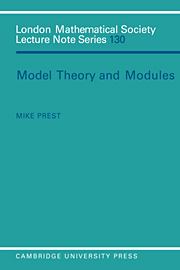Book contents
- Frontmatter
- Contents
- Introduction
- Acknowledgements
- Notations and conventions
- Remarks on the development of the area
- Section summaries
- Chapter 1 Some preliminaries
- Chapter 2 Positive primitive formulas and the sets they define
- Chapter 3 Stability and totally transcendental modules
- Chapter 4 Hulls
- Chapter 5 Forking and ranks
- Chapter 6 Stability-theoretic properties of types
- Chapter 7 Superstable modules
- Chapter 8 The lattice of pp-types and free realisations of pp-types
- Chapter 9 Types and the structure of pure-injective modules
- Chapter 10 Dimension and decomposition
- Chapter 11 Modules over artinian rings
- Chapter 12 Functor categories
- Chapter 13 Modules over Artin algebras
- Chapter 14 Projective and flat modules
- Chapter 15 Torsion and torsionfree classes
- Chapter 16 Elimination of quantifiers
- Chapter 17 Decidability and undecidability
- Problems page
- Bibliography
- Examples index
- Notation index
- Index
Chapter 8 - The lattice of pp-types and free realisations of pp-types
Published online by Cambridge University Press: 15 December 2009
- Frontmatter
- Contents
- Introduction
- Acknowledgements
- Notations and conventions
- Remarks on the development of the area
- Section summaries
- Chapter 1 Some preliminaries
- Chapter 2 Positive primitive formulas and the sets they define
- Chapter 3 Stability and totally transcendental modules
- Chapter 4 Hulls
- Chapter 5 Forking and ranks
- Chapter 6 Stability-theoretic properties of types
- Chapter 7 Superstable modules
- Chapter 8 The lattice of pp-types and free realisations of pp-types
- Chapter 9 Types and the structure of pure-injective modules
- Chapter 10 Dimension and decomposition
- Chapter 11 Modules over artinian rings
- Chapter 12 Functor categories
- Chapter 13 Modules over Artin algebras
- Chapter 14 Projective and flat modules
- Chapter 15 Torsion and torsionfree classes
- Chapter 16 Elimination of quantifiers
- Chapter 17 Decidability and undecidability
- Problems page
- Bibliography
- Examples index
- Notation index
- Index
Summary
One idea that I have been emphasising in these notes is that pp-types generalise right ideals, at least in their role as annihilators. This viewpoint will be even more explicit in later chapters. In this chapter, we systematically study the lattice of pp-types, bearing in mind its “quantifier-free version” – the lattice of right ideals.
We begin (§1) by noting that the poset P of pp-types is a modular lattice, and the meet and join operations are explicitly described. Then we see that a pp-type is irreducible (i.e., has indecomposable hull) iff it is meet-irreducible in P (justifying the terminology). A pp-type p may be irreducible because there is another pp-type q with the property that every pp-type strictly above p is above q: in that case, we say that p is neg-isolated, since it must then be equivalent to its pp-part together with the negation of a single pp formula. The distinction between those pp-types which are neg-isolated and those which are not turns out to be significant.
A pp-type is finitely generated iff it is realised in a finitely presented module. Half of this is shown in §2, but the proof is not completed until section 3. We see that the finitely generated pp-types form a sublattice of the lattice of all pp-types. Furthermore, a finitely generated pptype is irreducible, respectively neg-isolated, in the one lattice iff it is so in the other. All this will be of use to us when, in Chapter 11, we restrict our attention to finitely generated modules over right artinian rings.
- Type
- Chapter
- Information
- Model Theory and Modules , pp. 173 - 187Publisher: Cambridge University PressPrint publication year: 1988



